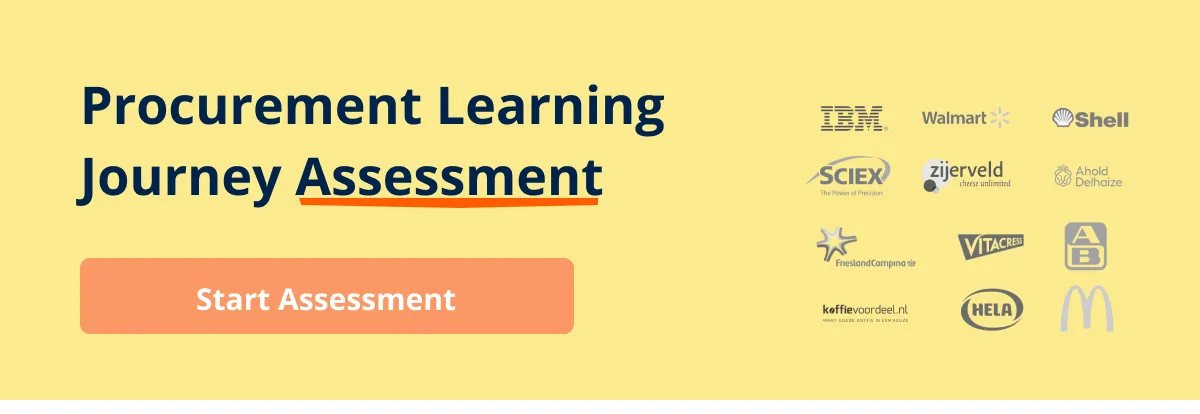ChatGPT & AI in
Procurement Course
Free Preview Lesson

Written by Marijn Overvest | Reviewed by Sjoerd Goedhart | Fact Checked by Ruud Emonds | Our editorial policy
Sustainable Supply Chain — The Ultimate Guide
Key take-aways
- A sustainable supply chain is the company’s commitment to evaluating the environmental and social repercussions of its products.
- A sustainable supply chain management drives green operations.
- Tracking sustainability metrics and using AI can help build a sustainable supply chain.
The sustainable supply chain is adopted by many companies due to the increasing pressure to demonstrate greater environmental and social responsibility. However, how can companies demonstrate tier responsibility through the supply chain?
In this article, we will discuss what a sustainable supply chain is all about. We will tackle why sustainability in the supply chain is significant and how it can be sustainable. Furthermore, we will cover all of the things that you need to know about a sustainable supply chain.
Once you are finished reading this article, it will allow you to know the impact of sustainability on your supply chain and also on the world. Additionally, it will allow you to achieve your corporate social responsibility.
Supply Chain Sustainability: What is it?
In recent years, there are numerous multinational corporations pledging to work only with suppliers that follow environmental and social standards. Thus, Sustainability in the supply chain is starting to gain popularity in many industries.
Supply chain sustainability is defined as the efforts of companies to consider the environmental and social impact of their products through the supply chain.
From raw materials sourcing to production, storage, and delivery, it monitors if these processes may cause harm to the environment and communities.
The aim of supply chain sustainability is to decrease environmental harm from factors like energy usage, water consumption, and waste production. It also aims to have a positive impact on the environment and communities around its operations.
A sustainable supply chain is one that fully integrates ethical and environmentally responsible practices into a successful and competitive model.
What is Sustainable Supply Chain Management?
Normal supply chain management focuses mainly on the cost, speed, and reliability of the operations. While this is also true for sustainable supply chain management, adding the goals of a company in upholding environmental and societal values. Thus, it addresses global issues such as climate change, human rights, water security, and fair labor practices.
Sustainable supply chain management is put into practice right from the procurement of goods or services to the delivery of the products. It also drives green operations and results in cost savings and an enhanced supply chain over the long term.
The Importance of Sustainability in Supply Chain
By the very nature of the supply chain, it usually involves energy-intensive production and transportation as goods are made and moved around the world. Thus, organizations can make the biggest difference by making changes to their supply chain instead of other business operations.
The complex system of the supply chain such as the numerous supplier relationships and border crossings make sustainable supply chain management challenging.
The complexity of the supply chain can hinder visibility into crucial operational considerations such as labor conditions at a supplier’s factory that is miles away. Focusing on a sustainable supply chain is the key not just to contributing to the world but also to improving productivity and optimizing costs.
How can Supply chains be Sustainable?
Many companies around the world have taken various steps to decrease their carbon emissions, cut back on waste, and improve labor conditions.
By tracking sustainability metrics in supply chain management systems, it monitors multifaceted programs that encourage greater environmental and social responsibility among suppliers.
Additionally, companies can use artificial intelligence and pre-defined rules to make sure that their products are not being shipped unnecessarily.
In order to build a sustainable supply chain, companies must identify the issues in their supply chain management.
The common thing to do is to break down the supply chain into various segments where a company can focus on adopting a circular supply chain where the raw materials are recycled back into the production process.
The reduction in waste by reusing and recycling the materials establishes a balance where input is equivalent to output.
Additionally, managing sustainable procurement is another important factor in making a sustainable supply chain.
Adopting a sustainable procurement model helps to understand day-to-day involvement with your suppliers. Companies must also be aware of sustainable procurement tools to fully adopt the model.
What are the Challenges that Companies Face in Supply Chain Sustainability?
The primary obstacle for companies, especially the small ones, in achieving a sustainable supply chain is cost. Obviously, it is difficult for small companies to afford the upfront costs of making the supply chain sustainable.
Although the cost of a sustainable supply chain is high, small companies can still invest in some things such as procuring compact packaging. This packaging enables the company to reduce the size and number of shipments as well as lower its environmental footprint.
On the other hand, some companies are struggling to achieve a sustainable supply chain as there are no sustainable options for components or their organizational structure hinders them to do so.
Although these challenges can be overcome, 20% of the respondents in a study have reported that customers are just simply uninterested. Thus, making it difficult to justify the additional costs and efforts.
Technology Components of a Sustainable Supply Chain
Listed below are the technology components of a sustainable supply chain that you should know about!
Artificial intelligence technologies allow the analysis of multiple different data sets across the supply chain.
It brings the capacity for synchronized intermodality and collaborative shipping in the sustainable supply chain. Thus, taking advantage to combine shipments or use less resource-heavy logistics.
Machine learning uses large data to help systems and connected devices adapt in real-time to find patterns, learn from experience, and automate agile and responsive workflows.
Many customers are expecting fast or next-day delivery nowadays. Thus, companies are pushing the existing capacity of warehousing and logistics to its breaking point.
Electronic drones and inventory management robots can be optimized to help improve workflow efficiency, optimize energy, and save on fossil fuel usage in logistics.
Blockchain is useful for sustainable procurement due to its ability to act as a single source of truth. Through the use of sensors, products can be accurately tracked back to their source to remove any thoughts as to their origin, quality, and handling.
RFID devices and other inexpensive small sensors can easily be put into products and raw materials. When parties involved in the supply chain comply with mandatory sensor attachment, it creates a high level of transparency.
The best sustainability solutions run on databases and ERP systems that can handle large data and complex processes.
The technologies and automated things of a sustainable supply chain are reliant upon the predictive and advanced analytics made by these modern centralized business systems.
1. Artificial intelligence (AI)
2. Machine Learning
3. Robots and automated devices
4. Blockchain
5. Sensors
6. Databases and ERP
Benefits of Sustainability in the Supply Chain
If you’re still on the fence when it comes to sustainability in the supply chain then take a look at some of the benefits you can get from it.
A survey by PWC between 2019 and 2020 revealed that there is almost a 7% drop in supply chain operations costs as a direct result of digital transformation.
50% of the respondents have indicated that investment in supply chain sustainability and transparency will be their utmost priority more than ever.
Governments all around the world are pressuring and mandating greater supply chain sustainability to meet the United Nations 2030 deadline for achieving sustainable development goals such as clean water for all.
Government regulations cover various areas which include the traceability of pharmaceuticals, avoidance of conflict minerals, and disposal of electronics.
Forbes magazine has recently published statistics showing that up to 88% of consumers are more likely to be loyal to companies that have strong environmental and social responsibility.
Consumer awareness for sustainable businesses has been increasing even before the pandemic. Now, the demand for a transparent supply chain and business practices has skyrocketed.
A reputation for sustainable and transparent supply chain practices gives companies a competitive advantage during difficult times and among their competitors.
When supply chain transparency is applied and implemented with digital security software, deceitful suppliers and manufacturers cannot hide.
These measures protect businesses from unethical and environmentally irresponsible partners. Furthermore, it can track and document all the handling, labor, and material components from its source to its destination.
1. Cost control
2. Compliance
3. Creates loyalty and reputation
4. Minimize risks
Conclusion
As the global focus on environmental and social responsibility intensifies, companies are adopting sustainable supply chain practices. This ultimate guide explores the intricacies of sustainable supply chains, emphasizing their significance, implementation, challenges, and technological components.
By understanding and incorporating sustainable supply chain management, companies can achieve corporate social responsibility goals and contribute positively to the world.
Frequentlyasked questions
What is a sustainable supply chain?
It refers to the efforts of companies to consider the environmental and social impact of their products.
Why is it important?
A sustainable supply chain is crucial to achieving corporate social responsibility. Additionally, it is the key to improving productivity and optimizing costs in the supply chain.
What is sustainable supply chain management?
Sustainable supply chain management involves implementing environmentally and financially viable practices into the complete life cycle of the supply chain.
About the author
My name is Marijn Overvest, I’m the founder of Procurement Tactics. I have a deep passion for procurement, and I’ve upskilled over 200 procurement teams from all over the world. When I’m not working, I love running and cycling.


